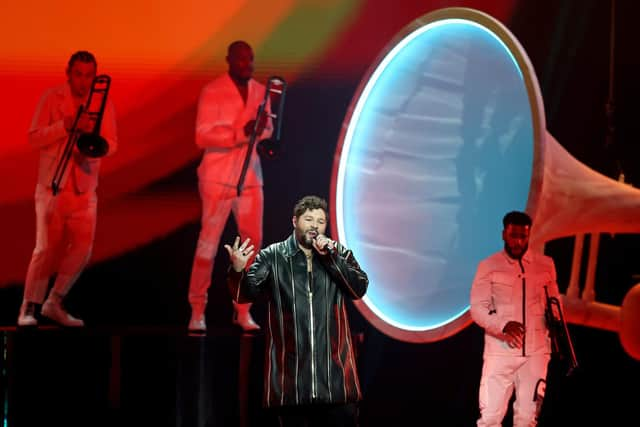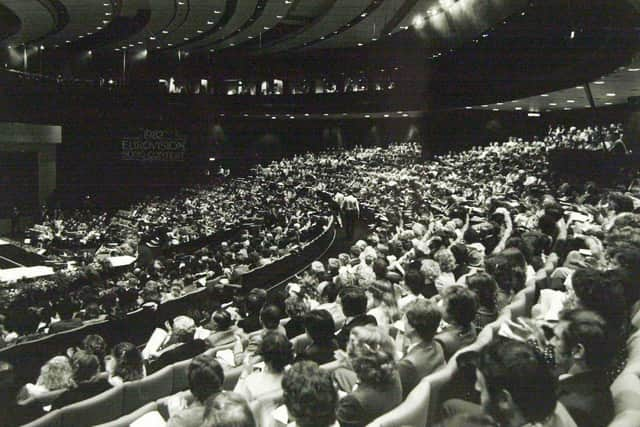Eurovision 2023: Yorkshire’s links with the song contest over its six decade history
As viewers across the globe tune into the 66th Eurovision Song Contest this weekend, there will be some fearing the worst for the UK.
And after last year, it’s perhaps not surprising. Singer James Newman, from Settle in North Yorkshire, was chosen to represent the UK in 2021 but his song Embers led to the nation failing to get a single point at the event. Still, he said he would “focus on the positives” of the experience – and there have been a number of those for Yorkshire over the contest’s six-decade history.
Advertisement
Hide AdAdvertisement
Hide AdThe contest itself, this year held in Turin, Italy, was established along the lines of the famous Italian Sanremo Music Festival, in 1956, when just seven countries competed using a live orchestra, with simple sing-along songs.


In 1957, the UK’s first entry was Hull singer Patricia Bredin, who had made a name for herself in musical theatre in London, and finished in seventh place with the song All, the first Eurovision song to be sung in English.
The first real flavour of Eurovision live for Yorkshire, came after Bucks Fizz won in Dublin for the UK, in 1981, with Making Your Mind Up. In winning, the UK had the right to stage the competition on home soil and Harrogate was chosen as the venue.
The contest preparations got under way, but not without controversy after France withdrew from Harrogate, labelling the show and its songs as “a monument to drivel”.


Advertisement
Hide AdAdvertisement
Hide AdThe late BBC producer Michael Hurll told Eurovision author Gordon Roxburgh the story of how the 1982 contest came to be at the new Harrogate Conference Centre.
Hurll explained: “They (Harrogate Council) gave it to us for nothing. In fact, I didn’t see it with the seats in it until about a week before the contest, and I don’t think it was completely finished by the time we used it.”
After the stage was built, the audience capacity was reduced to 1,400 (from 2,000) and the broadcast was beamed to 30 countries, with a worldwide audience put at 300 million.
The running order for the evening’s 18 countries taking part was drawn up by Harrogate police inspector Dennis Galtry. BBC newsreader Jan Leeming was the presenter of the show, mainly because she spoke French. She said: “My biggest fear was forgetting my words. There was no autocue because the cameras were too far away.”
Advertisement
Hide AdAdvertisement
Hide AdJournalist and broadcaster John Kennedy O’Connor was working at Yorkshire contest. Reflecting on the event, he says: “Harrogate was a fun time. I’d never been there before and it was a really lovely town that embraced the contest.
“Prior to that, I’d only been to two larger contests in the Netherlands in 1980 and in Ireland in 1981 and neither the Hague nor Dublin seemed to share the same attitude and celebrate having the show in town, in the way that Harrogate did.”
John, who has previously written about the history of the contest in his book The Eurovision Song Contest: The Official History, recalls of the Harrogate event: “The BBC started the show with an animated map of Europe and asked the question ‘Where’s Harrogate?’ in a multitiude of languages. If I’m being honest, I suspect most Europeans still don’t know the answer.
“I think Brighton, which staged the 1974 contest, was a similar sized town, but somehow Harrogate felt cosy and unique. There were flags everywhere and some of the shop windows had mounted special displays.
Advertisement
Hide AdAdvertisement
Hide Ad“The locals really seemed excited to have the contest in town and the few singers I connected with thought it a lovely place for the contest. It was a tiny auditorium that was very cramped. The set was tiny but cleverly designed to create a sense of space that really didn’t exist.”
He adds: “I think when folks poured onto the London-bound train on Sunday after the contest, there was a sense that something special had happened in Harrogate. I even went back the following year to visit.”
Last month the 40th anniversary of the centre saw a group of Eurovision fans gathered on the date the contest was held – April 24 – to mark four decades of togetherness and music fun.
One of the fans, Emily Roberts, was ten years of age when the contest came to Harrogate and last month played a rendition of that year’s winning song Ein Bisschen Frieden (A Little Peace) sung by Germany’s Nicole.
Advertisement
Hide AdAdvertisement
Hide AdEmily, who will be in Turin for this year’s contest, says: “I’ve loved the contest since I was old enough to stay up for the voting. I love the fandom.”
The biggest Eurovision fan club in the world has Yorkshire ties too. It is led by a Vaughan Staples, of Golcar, Huddersfield, and has more than 2,300 members. Vaughan, who was recently appointed to the post of president of Organisation Générale des Amateurs de l’Eurovision(OGAE), will oversee events and tickets allocation to hundreds of fans travelling to Turin.
He explains: “Many people believe the contest to be dated and political but the contest offers various genres of music that can launch an artist’s career. If you compare the actual politics of a country to that of the scores awarded in the contest, most viewers would be pleasantly surprised.
“What viewers often see is a show full of love, compassion, enjoyment, excitement and tolerance, almost on a global level, through a competition that has never more been needed.”
Advertisement
Hide AdAdvertisement
Hide AdVaughan, who hails from the Black Country, recalls watching the contest with his family during the 1990s. “And then believe it or not, the event came to Birmingham in 1998. I was 11 and I remember being excited and my family throwing a big party to celebrate.
“Watching those first few contests, I witnessed so many different genres of music, which to me played out as a celebration of both the countries involved and their individual cultures.”
Yorkshire’s James Newman is not the only Eurovision participant who has come from the region. In 1977, Leeds-born Mike Moran and Lynsey de Paul finished runners up and not as their song Rock Bottom, suggested.
Two years later, Leeds Brotherhood of Man band member Sandra Stevens lifted the trophy with the group, who won with the song Save Your Kisses for Me. In 1979, Black Lace, with members including former Huddersfield Polytechnic student Terry Dalton from Wakefield, and Barnsley’s Alan Barton, finished seventh with the song Mary Ann. Then there was the effort of Sheffield’s teenage schoolgirl Lindsay Dracass, with her song, No Dream Impossible, finishing in 15th spot.
Advertisement
Hide AdAdvertisement
Hide AdThis year, it’s over to Sam Ryder, from Maldon in Essex, to represent the UK with song Space Man, which he’ll perform in the grand final on Saturday. But regardless of the result, Vaughan says the Eurovision ideal is to “bring people of every nationality closer together”.
The Eurovision Song Contest final will air on BBC One, May 14, at 8pm.
